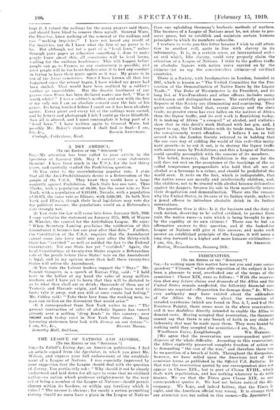INDEMNITIES.
[TO THE EDITOR or THE " SPECTAT08."1 SIR,—In writing upon this matter have not you and your corre- spondent " Utinam," whose able exposition of the subject it has been a pleasure to read, overlooked one of the terms of the
armistice Clouse XIX. runs as follows "With the reserva- tion that sits future claims and demands of the Allies and the United Stales remain -unaffected, the following financial con- ditions are required :—Reparation for damage done," &c. What- ever ambiguity may have existed about the addendum of the Allies to the terms about the evacuation of invaded territories (which are found in Nos. 6, 7, and 8 of the Fourteen Points), there seems none in the above reservation, and it was doubtless directly intended to enable the Allies to demand costs. Hering accepted that reservation, the Germans cannot say that there is any breach of faith in any claim of indemnity that may be mnde upon them, They were liotind by nothing until they accepted the armistice.—I am, Sir, &e.,
Woodhouse Races, Loughborough. WM. HARDING.
[We agree that the reservation our correspondent quotes disposes of the whole difficulty. According to this reservation, the Allies explicitly preserved complete freedom of action 54 to demanding " the cost of the war," and therefore there can be no question of a breach of faith. Throughout the disenssiou, however, we have relied upon the American text of the armistice terms as published in the Official U.S. Bulletin. In that text the reservation quoted by our correspondent does not appear in Clause XIX., but is part of Clause XVIII., which deals with repatriation, and has nothing whatever to do with finance. AVo see that the Times gave Clause XIX. as our correspondent quotes it. We had not before noticed the dis- crepancy. We hope, and indeed believe, that the Times is right, and the American official text wrong. It is strange that our attention was, not called to this sooner.—En. Speetetorl


































 Previous page
Previous page